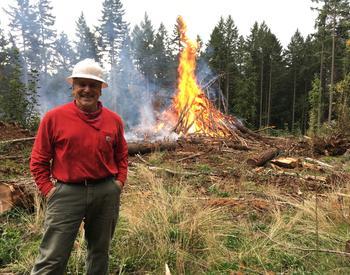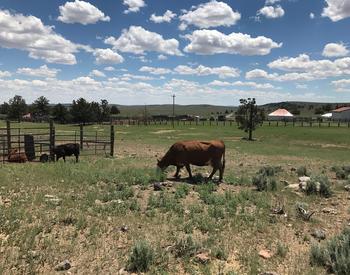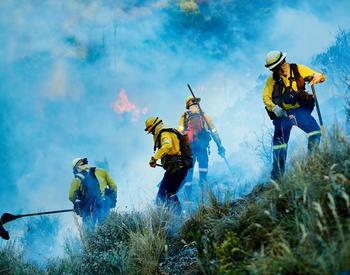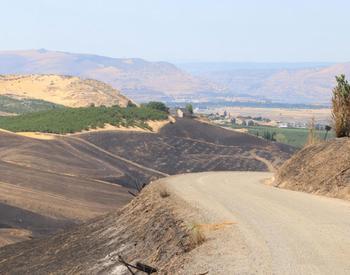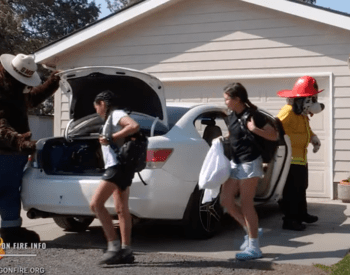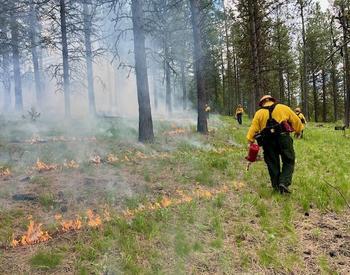Note: Oregon State University Extension Service employees are among the tens of thousands of Oregonians who have been evacuated due to the wildfires. Here are three of their stories.
TALENT, Ore. – It was about noon on Tuesday, Sept. 8, when Gordon Jones first heard about a fire that was heading north from Ashland.
Jones, an Oregon State University assistant professor of practice and Extension agriculture faculty in Jackson and Josephine counties, works at the Southern Oregon Research and Extension Center (SOREC) in Central Point. He decided to head home to his apartment in Talent to start collecting supplies and valuables.
He still hadn’t heard anything about what is now known as the Almeda Fire.
“Then I went for a walk around town,” Jones said. “By about 4 p.m. they had basically stopped fighting the fire from the ground in Talent and instead were chasing the front line to the north to try to protect Medford. The wind was blowing hard that direction. I spoke with a number of people who were standing watching their homes burn down.”
After witnessing that heartbreaking scene, he went back home to give his neighbors an update and did a second round of collecting things in the event of an evacuation order.
“As I went for a second walk through Talent, the police were broadcasting ‘get ready’ orders in my apartment complex and airplanes and helicopters were dropping a lot of water and retardant. At about 6 o’clock, the police rolled through again and told us to leave.”
Both Interstate 5 and Highway 99 were closed, so vehicles were pushed on to backroads.
“It was very slow going,” he said. “I ended up heading to SOREC and the power was on and the Internet was working. So, I spent the night trying to sleep on the floor of my office. The wind was blowing the fire generally toward SOREC but that part of the county wasn’t under evacuation warnings. I knew if the fire got close, I could run our lawn sprinklers and/or go stand in our large, well-watered alfalfa field.”
He rose at daybreak on Wednesday morning and went back to Talent and nearby Phoenix, finding that large areas of both towns had been destroyed.
“Thankfully the fire stopped about two blocks away from my apartment complex,” said Jones, who has been staying in a hotel.
A fleeting feeling of safety
Two hours to the north, Alicia Christiansen and her husband, Ben, woke up to see the French Creek Fire burning a couple of miles away. They live on 12 wooded acres in the Little River area of Glide.
“We could see trees flaring up, so we figured we should prepare the outside of our home just to be safe, in case of embers,” said Christiansen, the OSU Extension forestry agent for Douglas County. “We brought in patio furniture and propane tanks, closed all the windows, and watered down all of the vegetation near our house. Within a couple of hours, we knew we didn’t need to worry about the French Creek fire threatening our home. That feeling of safety didn’t last long.”
By midmorning, Ben, who is a forester, heard on the fire radio that there were two new fires near the North Umpqua River near Highway 138 East – the Archie Creek and Star Mountain fires. As the crow flies, the Christiansens, who have a 4-month old son, Quincy, and two dogs, don’t live very far from where the Star Mountain Fire started.
“Ben told me to start packing and he would be heading home to help,” she said. “Around noon, it became very apparent that the Star Mountain Fire was growing rapidly. The Douglas County sheriff hadn’t issued any evacuation warnings yet, so we were comfortable taking our time packing all of the essentials and irreplaceable items. We also took the time to take photos and video of all our belongings left behind. We left in the early afternoon to go stay at a friend’s house in Roseburg.”
That evening, a Level 3 “go now” evacuation was ordered for Glide and the surrounding areas. The Archie Creek and Star Mountain fires merged into what is now called the Archie Creek Fire. The Christiansens are still in Roseburg. The fire has burned to the ridge opposite their house and crept down the hill in spots towards Little River, but it hasn’t crossed the river – yet.
“We have no clue how long we will be evacuated for,” she said. “This has been challenging and emotionally draining for us, especially since we have an infant. But we are all together and that’s the most important thing. Whatever happens, at least we have each other and know that our family and pets are safe.”
The sky was ‘beautifully terrifying’
While the fires flared in southern Oregon, the threat level rose quickly in the Christmas tree farming areas of the northeast Willamette Valley. Tiffany Hopkins, statewide coordinator for Extension’s Master Woodland Manager program and Women Owning Woodlands Network, lives on 26 acres in Colton with her husband, Colby, and 10-month old son, Rhett.
On the morning of September 8, Colby, who is a structural firefighter paramedic, returned home from “what he described as the craziest shift he has ever had,” Tiffany Hopkins said.
“He had been up since 2 a.m., fighting a fire in West Linn,” she said. “The sky at our house was very smoky and eerie. We discussed the potential for being evacuated and/or the fire coming near our home, but we really didn’t think it was possible. Just in case – I presume because both of our careers would direct us to do so – we packed a ‘go bag’ and started watering down the perimeter of our home. At this point we thought we were being extremely overly cautious.”
Hopkins went to Oregon City for a doctor’s appointment. As she headed home, she saw hundreds of trailers going in the opposite direction. “The smoky sky was ‘beautifully terrifying,’” she said. “My gut was telling me things had drastically changed since I left.”
It kept getting darker. By the time she made it home, the sky was black. Ash was floating down like snowflakes. There were two fires nearby, the Unger and Riverside fires. Tiffany Hopkins pushed the idea that they leave on their own terms, before getting an evacuation notice or a knock on their door. Then she calculated the closest fire was about 1¼ miles away. They were confused because they hadn’t received any evacuation notices.
They decided it was time to go.
Just as they were close to finish packing, they got a Level 3 “go now” order. They immediately went to her parents’ house in Sandy. That lasted for a day, when they were placed under a Level 2 “be ready” notice. They preemptively evacuated again and drove over the Cascades to stay in their camping trailer in Prineville.
“On Thursday, the smoke rolled in extremely thick, to the point it was unsafe for us and our baby to be breathing,” she said. “We again evacuated to a friend’s house in Prineville where we could have a safer air environment. On Sunday, we returned to my parents’ home in Sandy for Colby’s job.”
They are still in Sandy, where the threat has decreased. They’ve gotten word that their home is safe – for now.
“Last night the winds shifted and that could move the fire,” she said. “We have no idea when we will be able to return. This time has been extremely emotionally draining for us and we’ve met new challenges every day. However, we’ve focused on the fact that we have a safe place to be and we are all together. In the end that is absolutely all that matters."
